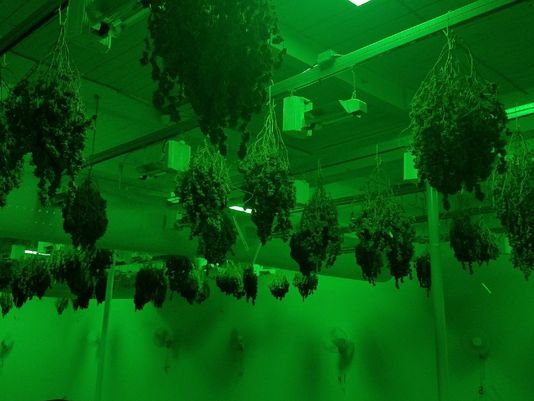
Aug 29, 2018 | Michigan Medical Marijuana Association, News
Medical marijuana home delivery under consideration in Michigan
8/29/18
Medical marijuana patients might be able to soon have their medicine delivered… right to their homes under a proposed set of rules. Michigan officials are reviewing this with consideration.
Provisioning centers could send out an employee to deliver products to patients directly in a transaction as simple as ordering a pizza or Chinese food.
Marijuana home deliveries are allowed in Oregon, California and Nevada — though their programs are not all universal. Colorado, Washington, Alaska and Washington D.C. don’t allow for home delivery.
Under the proposed rules in Michigan, medical patients could order online and pay online for home deliveries.
Provisioning centers would be allowed to staff one person to make home deliveries, who could only deliver to three patients at a time, according to the proposed rules. The provisioning center would have to be able to track the delivery’s GPS location at all times during the delivery, and logs would have to be kept. Deliveries would only be allowed to the home address of the patient.
Medical patients living in a city or township that has banned medical marijuana businesses from operating could receive deliveries from provisioning centers, said David Harns, spokesman for the state’s Bureau of Medical Marijuana Regulation.
A hearing on the permanent rules is set for Sept. 17. The emergency rules and permanent rules are largely the same, save for the ability of provisioning centers to make deliveries, Copenhaver said.
From MLive
- Join Komorn and other special guests at the Bay City MMLE Networking Meeting on 9/12/18

Aug 3, 2018 | Blog, Court Case Files, News
According to some cannabis attorneys patients and caregivers as well as cultivators in Michigan can’t process their plants without breaking the law as a result of a Court of Appeals decision.
During the drying process between when a marijuana plant is harvested and completely dried for use (AKA -wet marijuana), that time is not covered by the state law, according to a Michigan Court of Appeals decision ruling on July 19, 2018.
The appeals court case — People v. Vanessa Mansour — arises from a police raid at Mansour’s Troy home. There they found marijuana plants and marijuana buds in different stages of wet and drying. They also found dried marijuana buds.
Mansour was a medical marijuana patient at the time.
Mansour’s defense argued that the marijuana that was drying was not usable and therefore qualified her for immunity under state law. They argued the drying marijuana should not be considered as authorities made up their charges.
“To say that the legislature makes it legal to possess growing plants and to possess a limited amount of finished product — but that in between, everybody is just illegal — that’s the interpretation that the Court of Appeals has hoisted on everybody,” Neil Rockind said.
The Carruthers ruling is outdated and not relevant, Rockind said.
Court’s interpretation of § 4 of the MMMA in People v Carruthers, 301 Mich App 590, 609; 837 NW2d 16 (2013), was controlling, and that the holding of Carruthers required the trial court to consider the total amount of marijuana possessed by defendant, not just the total amount of usable marijuana.
Rockind said it conflicts with state law and with People vs. Manuel, which the Court of Appeals previously decided. The Michigan Supreme Court has already had to refer a medical marijuana case back to the Court of Appeals due to the Manuel ruling, Rockind said.
In Manuel, the defendant was “both a qualifying patient and a primary caregiver for five patients, so he was allowed . . . to possess up to 15 ounces, or approximately 425.24 grams, of usable marijuana under the MMMA.” Manuel, 319 Mich App at 300. The marijuana he possessed was well in excess of that amount, however. The trial court held that “the marijuana . . . was unusable because it was in ‘various stages of drying.’ ” Id. at 122. It therefore ruled “that the defendant was entitled to § 4 immunity and dismissed the charges against him.”
But the COA referred to the second prong of Carruthers analysis stating.
Importantly, however, neither the prosecution nor the defendant in Manuel cited to Carruthers. Nor, perhaps largely for that reason, did this Court in Manuel cite to Carruthers.
And, consequently, neither the parties nor this Court in Manuel ever reached the second prong of the Carruthers analysis:
In short, the question of whether a possessor of marijuana possesses an allowed quantity of usable marijuana is only the beginning of the relevant inquiry under
4. A further pertinent and necessary inquiry, for purposes of a § 4 analysis, is whether that person possesses any quantity of marijuana that does not constitute usable marijuana under the term-of-art definition of the MMMA. If so, and without regard to the quantity of usable marijuana possessed, the person then does not possess “an amount of marihuana that does not exceed . . . 2.5 ounces of usable marihuana . . . .” MCL 333.26424 (a) and (b)(1) (emphasis added).
Instead, he or she then possesses an amount of marijuana that is in excess of the permitted amount of usable marijuana. In other words, the language establishing limited immunity in § 4 of the MMMA expressly conditions that immunity on the person possessing no amount of marijuana that does not qualify as usable marijuana under the applicable definitions. Carruthers, 301 Mich App at 610.
Rockind said he plans to take the case to the Michigan Supreme Court.
Michigan voters will soon be asked to consider a ballot proposal Nov. 8, 2018 that would make recreational marijuana legal in the state.
Komorn Law has represented numerous clients through the legal chaos of starting up a business in the Michigan Medical Marihuana Industry.
Contact Us For More Information.
800-656-3557

Aug 2, 2018 | Blog, News, Recent Victories
July 31, 2018 – A Judge dismissed felony charges against six people arrested in a raid of a Detroit medical marijuana grow facility.
2 months ago, the authorities raided what they believed was an illegal marijuana grow operation in Detroit.
But an attorney in the marijuana business now says all the charges have been dropped.
FOX 2 TV Report
All charges against Curtis Williams, 36; Cotea Jeanne Walsh, 37; Jones, 53; Travis Davison, 27; Jabari Currie, 31; and James Frazier, 32, of Detroit, were dismissed following a raid in the city of Detroit on May 29, 2018.

“We knew that it had to go this way. Fundamental fair play, you come to expect that to a certain degree,” says lawyer Thomas Lavigne. He represents Viola Brands, the cannabis company operating in southwest Detroit that police and federal agents raided back in May.
The Wayne County Prosecutor’s Office says the court held that the defendants, Viola Employees, operated in good faith in complying with the law and the number of plants they could have inside the building, and it was on the City of Detroit to inform them about what was required – and it failed to do so.
But a defense attorney says Viola had less than the maximum of 1,500 plants in the building and all of its affairs, from its temporary state license to its certificate of occupancy, were in order.
SEE TEMPORARY PROVISIONING CENTER LIST HERE

Judge Kenneth King of 36th District Court dismissed the case “in the interest of fairness.”
Komorn Law has represented numerous clients through the legal chaos of starting up a business in the Michigan Medical Marihuana Industry.
Contact Us For More Information.
800-656-3557

Aug 1, 2018 | Blog, News, Recent Victories
July 31, 2018 -A Detroit Judge dismissed felony charges against six people arrested in a raid of a Detroit medical marijuana grow facility.
All charges against Curtis Williams, 36; Cotea Jeanne Walsh, 37; Jones, 53; Travis Davison, 27; Jabari Currie, 31; and James Frazier, 32, of Detroit, were dismissed following a raid in the city of Detroit on May 29, 2018.

Charges included felony drug delivery and manufacturing charges, both carrying up to 15 years in prison.
Prosecutors argued that the facility on the 4400 block of West Jefferson Avenue was not licensed to grow marijuana.

(Photo: Detroit Police Department)
The Detroit Police Department’s Gang Intelligence Unit executed a search warrant at the medical marijuana facility and seized 200 marijuana plants, about $1 million worth, authorities said.
“Over 1,000” plants were found in the raid, according to the Wayne County prosecutor’s office.
Officers seized marijuana and held employees at gunpoint during the May 29 raid, according to Harrington and his partners in the Denver-based marijuana company Viola Brands.
All cannabis at the site was taken, the business’ accounts were frozen and employees’ vehicles were seized, according to the company.
A defense attorney in the case, Michael Komorn, said the facility was granted a temporary operation’s certification from the city, allowing up to 1,500 plants while the facility waited for the filing process to be approved by the city. Komorn said the Wayne County Prosecutor’s Office made the argument that the facility only was allowed to sell, and not grow, at the facility.
“That’s absurd,” Komorn said. “It’s a semantic issue because I would say everyone would understand that if they’ve been given permission to sell it, of course a medical marijuana caregivers center includes growing and cultivating marijuana.”
The grow op’s certificate of occupancy from the city stated the intent for a greenhouse at the site, and the operation holds a temporary Class C license under Michigan’s Medical Marihuana Facilities Licensing Act allowing up to 1,500 plants, said 36th District Court Judge Kenneth King.
Judge Kenneth King of 36th District Court dismissed the case “in the interest of fairness.”

“In the interest of fairness and in the spirit of always trying to do the right thing, this court is left with no other choice but to dismiss this matter,” the judge said.
King said he stayed up until 3:30 a.m. reading briefs in the case and sorting out the web of acronyms tied to Michigan’s medical marijuana law and the “seed-to-sale” tracking and tax, regulation and licensing system for marijuana growers and dispensaries that took effect late last year.
“That kind of leads me to the burning question: if you’re able to dispense but you can’t grow it, how are you supposed to get it? Where are you supposed to get it from?”
“I don’t believe the police had any malintent. The police are doing their job,” King said. “I think the real blame lies on the documents that were submitted and someone didn’t pay close attention to what the defendants were asking for.”
Komorn said King understood his argument, and said the judge responded: “That kind of leads me to the burning question: ‘If you’re able to dispense but you can’t grow it, how are you supposed to get it? Where are you supposed to get it from?’ ”
The case had been set for a preliminary exam Tuesday. King said he expected his ruling to be appealed regardless of whether it favored the prosecution or defense.
Here is a statement from the Wayne County Prosecutor’s Office:
“I have confirmed that the court granted the defense motion to dismiss the case. However, I don’t have a written opinion.
“It is my understanding that the court held that the defendants operated in good faith regarding all the provisions of the law that they knew about the class C license (1500 plants) for a grow operation. The duty was on the city of Detroit to inform them about what was required and they failed to do so.”
All charges were dismissed Tuesday July 31, 2018.
Also…Michigan voters will decide on a ballot question Nov. 6 that would legalize and tax recreational marijuana for users 21 and older. Medical marijuana was legalized in Michigan via a ballot proposal in 2008.
See the FOX 2 News Report
Komorn Law has represented numerous clients through the legal chaos of starting up a business in the Michigan Medical Marihuana Industry.
Contact Us For More Information.
800-656-3557

Jul 10, 2018 | Blog, Cannabis Science, Health Benefits of Marijuana, Medical Marijuana
8 Cannabinoid Acids Produced by Cannabis
Cannabis produces a variety cannabinoid compounds many of which have not been detected in any other plant.
Most of them are present at very low levels, especially in commercial cannabis products, making it difficult for scientists to accurately detect them.
Cannabis synthesizes several cannabinoid acids . These acids are created, usually by heat, to yield the compounds that most are after (THC or CBD). But in addition to THCA and CBDA, there are number of related cannabinoids that can be produced by Cannabis.
These are:
Click the item to read in depth detail from the .gov chemical database.







